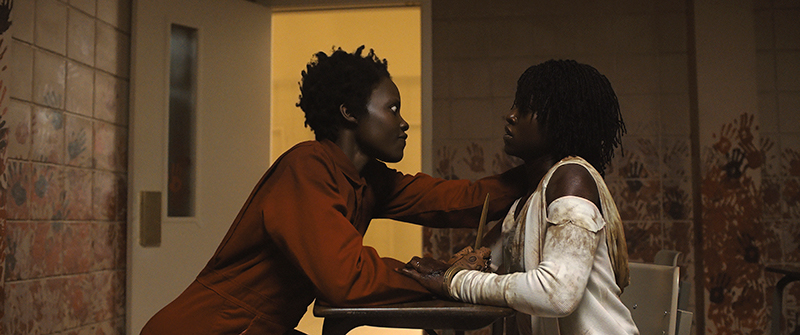Us

Red (Lupita Nyong'o) and Adelaide Wilson (Lupita Nyong'o) in "Us," written, produced and directed by Jordan Peele. Photo Credit: Industrial Light & Magic/Universal Pictures

There’s an idea of a horror film at the center of Jordan Peele’s US, and it begins with a primal fear: What if you weren’t yourself? Or, as Arnold Schwarzenegger once astutely put it, “If I’m not me, then who the hell am I?”
The Wilsons—Gabe (Winston Duke), Adelaide (Lupitia Nyong’o), Zora (Shahadi Wright Joseph), Jason (Evan Alex)—are like every other American family, except a terrifying childhood experience left Adelaide distant and wary. It turns out Adelaide’s fears are rational. During a childhood trip to the beach, Adelaide disappeared off into a boardwalk funhouse. When she returned, she wasn’t herself.
Her adorably dorky spouse, Gabe, draws familiar laughs from the audience as he guilts her, in a rather husbandly way, into making the drive with him and the kids back to the site of the childhood trauma.
When they arrive, they encounter a man Adelaide saw years ago at the same beach, carrying a sign that reads, “JEREMIAH 11:11”. The Biblical verse it references foreshadows, “Therefore thus saith the LORD, Behold, I will bring evil upon them, which they shall not be able to escape; and though they shall cry unto me, I will not hearken unto them.”
They press on, and meet up with neighbors, Kitty (Elisabeth Moss) and Josh (Tim Heidecker), who epitomize the American love/hate relationship. This comes into play later. Despite one brief scare when Adelaide loses sight of her son, the trip proves uneventful, if only because it follows the pattern of the modern horror movie fake-out.
Later that night, intruders appear at their doorstep. Red, Abraham, Umbrae, and Pluto, look just like them, but wear red jumpsuits. They’re like shadows, Red says. And there are more of them. Duke breaks some tension as he confronts the strangers, puffing his chest and deepening his voice, trying his damnedest to sound like anything other than a big teddy bear. The film’s prologue intimates that there are many sewers and underground tunnels that are long since abandoned. Now we know what, or who, festers there.
I’m not sure I always care whether a horror film explains why God forsakes the soon-to-be-zombie-food inhabitants, but here it becomes a problem precisely because Peele’s film brims with possibilities and metaphors left unexplored. The director’s 2017 debut, GET OUT, bursts at the seams with originality and depth, which aren’t so much ignored here as they’re set up and then undercut by unnecessary deference to convention.
You can tell Peele worked very hard on getting the characterizations right, and the cast, especially Winston Duke and Lupita Nyong’o, give marvelous performances—particularly in a scene in which the latter’s internalized emotion manifests in an intricately-choreographed fight. Yet, if we pause long enough to set aside the exhilaration of the tension, the intrigue of the under-worldly premise, and think about the construction of the narrative, failures of logic sprout up everywhere like zombies that won’t die.
With all the disconnected underground spaces, how do the shadow people know exactly where to be at any given moment? What happens when their genteel counterparts emigrate? Are there infinite copies of everyone everywhere? Why not inhabit liminal space? By the time you get this far, the pivotal moment arrives on which the entire movie rests and you ask yourself, “Why did she wait that long? How can she make that speech?”